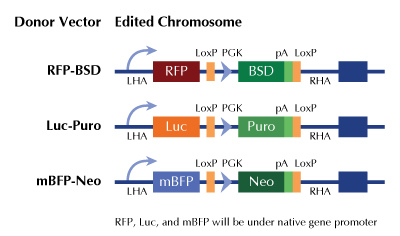LDL Receptor (LDLR) Human Gene Knockout Kit (CRISPR)
CAT#: KN200006BN
LDLR - human gene knockout kit via CRISPR, HDR mediated
Functional Cassette: GFP-puro Luciferase-Puro RFP-BSD
HDR-mediated knockout kit validation
USD 1,657.00
4 Weeks*
Specifications
| Product Data | |
| Format | 2 gRNA vectors, 1 mBFP-Neo donor, 1 scramble control |
| Donor DNA | mBFP-Neo |
| Symbol | LDL Receptor |
| Locus ID | 3949 |
| Components |
KN200006G1, LDL Receptor gRNA vector 1 in pCas-Guide CRISPR vector KN200006G2, LDL Receptor gRNA vector 2 in pCas-Guide CRISPR vector KN200006BND, donor DNA containing left and right homologous arms and mBFP-Neo functional cassette. GE100003, scramble sequence in pCas-Guide vector |
| Disclaimer | These products are manufactured and supplied by OriGene under license from ERS. The kit is designed based on the best knowledge of CRISPR technology. The system has been functionally validated for knocking-in the cassette downstream the native promoter. The efficiency of the knock-out varies due to the nature of the biology and the complexity of the experimental process. |
| Reference Data | |
| RefSeq | NM_000527, NM_001195798, NM_001195799, NM_001195800, NM_001195802, NM_001195803 |
| UniProt ID | P01130 |
| Synonyms | FH; FHC; LDLCQ2 |
| Summary | The low density lipoprotein receptor (LDLR) gene family consists of cell surface proteins involved in receptor-mediated endocytosis of specific ligands. Low density lipoprotein (LDL) is normally bound at the cell membrane and taken into the cell ending up in lysosomes where the protein is degraded and the cholesterol is made available for repression of microsomal enzyme 3-hydroxy-3-methylglutaryl coenzyme A (HMG CoA) reductase, the rate-limiting step in cholesterol synthesis. At the same time, a reciprocal stimulation of cholesterol ester synthesis takes place. Mutations in this gene cause the autosomal dominant disorder, familial hypercholesterolemia. Alternate splicing results in multiple transcript variants.[provided by RefSeq, Sep 2010] |
Documents
| Product Manuals |
| FAQs |
| SDS |
Resources
Other Versions
| SKU | Description | Size | Price |
|---|---|---|---|
| KN200006 | LDLR - human gene knockout kit via CRISPR, HDR mediated |
USD 1,657.00 |
|
| KN200006LP | LDLR - human gene knockout kit via CRISPR, HDR mediated |
USD 1,657.00 |
|
| KN200006RB | LDLR - human gene knockout kit via CRISPR, HDR mediated |
USD 1,657.00 |
|
| KN400006 | LDLR - KN2.0, Human gene knockout kit via CRISPR, non-homology mediated. |
USD 1,657.00 |
|
| GA102675 | LDLR CRISPRa kit - CRISPR gene activation of human low density lipoprotein receptor |
USD 1,657.00 |
{0} Product Review(s)
Be the first one to submit a review






























































































































































































































































 Germany
Germany
 Japan
Japan
 United Kingdom
United Kingdom
 China
China
